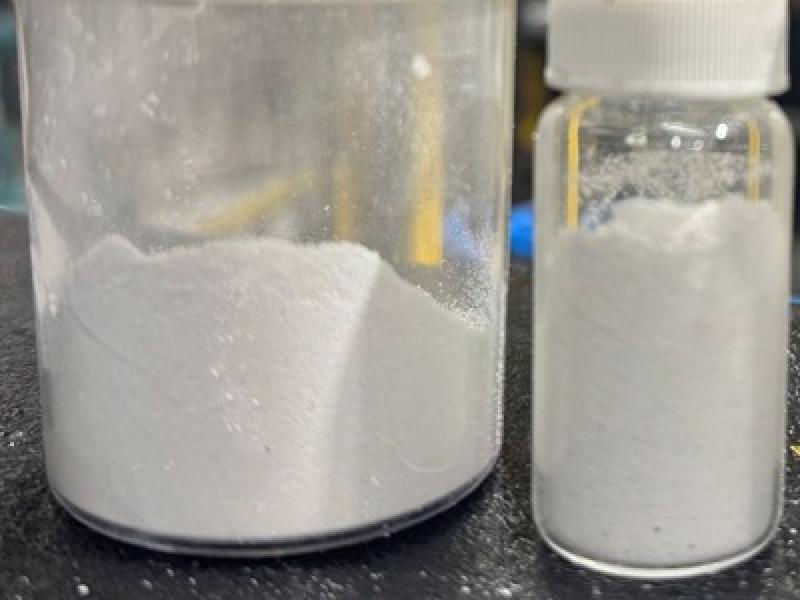
Kitchener, Ont.-based Alora is an agriculture startup with big ambitions, starting with growing rice plants directly in seawater around the world.
The company was founded in 2019 by two graduates of Durham University. Originally known as Agrisea, founders Luke Young and Rory Hornby say they have genetically edited rice plants to “switch on” their salinity tolerance, allowing the plants to grow in ocean water or in salt-damaged lands.
“We reactivate that dormant salt tolerance. So these plants can thrive, whether that's floating on the ocean surface, or in soils that have been irrigated or affected by soil level, or saltwater, either through sea-level rise, climate change or overuse of fertilizers,” Hornby, Alora's chief sustainability officer, told SustainableBiz.
“That's the main technology that allows us to be able to grow in these areas and that's supported by two other technologies.”
The process includes a physical structure engineered by Alora to allow the plants to grow on the ocean surface, which recreates the structure of soil and allows the roots to grow into the water beneath. The company also developed a bacterial fertilizer.
Alora’s roots
To help advance their plans, Young and Hornby applied to incubators around the world, which included a four-month stint in San Francisco. The pair eventually decided on the University of Waterloo’s Velocity, which has incubated over 400 companies since 2008.
“We wanted to go somewhere where we could really focus on R&D, a really good place to actually build the tech that didn't have the prices of San Francisco. We had a call with the team here at Velocity and it's an amazing space,” Hornby said.
“There's a huge tech scene, one of the largest in Canada here . . . It's been a great place to really hunker down, focus on the R&D and get all those results under our belt.”
The company has eight employees.
According to a company presentation, the current global rice market is worth $311 billion annually. The same presentation states rice farming is responsible for 1.5 per cent of all greenhouse gas emissions.
"It is actually getting closer to about a third of all land that is used for agriculture is actually experiencing some level of salinity that is detrimental to yield or the health of the crop, or really any aspect of the biodiversity within that system as well," Young, Alora's CEO, said.
Alora’s platform
Alora has been able to grow crops with up to 16 grams of salt per litre of water.
It's in the midst of a pilot project in Singapore via a collaboration with St. John’s Island and is aiming to reach 24 grams per litre by the end of the year. The ocean’s salt levels are typically between 28 to 32 grams per litre, depending on the location.
Young explained there are plenty of landlocked areas with salinity levels of four to six grams per litre, which is enough to “decimate” a rice paddy. Many plants can only withstand 0.5 grams per litre.
“We have successfully been able to grow crops in a freshwater setting . . . all the way up to maturity and actually harvest in this brand-new designed farm and farming platform,” Young said.
For land agriculture, Alora is also running a pilot in Guelph, Ont., where the company is hoping to achieve the same yield parity as regular agriculture as well as taste profile, texture and other product features.
“That's really opening the avenue for us to be a revenue-positive company. And so by the end of this year, we're looking to have three commercial deals with a variety of different companies based around the world,” Young said.
The fertilizer is comprised of two bacteria that break down atmospheric nitrogen and methane into a carbon source for the plants.
Hornby explained rice agriculture produces huge quantities of methane, which is prevented by the presence of salt. So by growing in the ocean or in saline soils, Alora's farms would be methane-negative.
“In terms of the bacteria, we'd be able to show that we can fix roughly 50 per cent of the nitrogen that a plant would require,” Hornby said. “Imagine if you could use 50 per cent less fertilizers on every field. And that's effectively where we're at right now.”
Alora’s future
In Singapore, Alora is in the engineering phase testing its farming platform. In March, it aims to have plants in a simulated ocean environment via a tank that’s three metres in diameter. If all goes well, those plants would then go into the ocean.
The company presentation lists Grand Bahama Island, Kenya, Namibia, Madagascar, India and the U.S. as potential locations for Alora's land and sea farms by 2026.
“Those are areas that we have connections with,” Young said. “We've had interest from partners at various levels, from corporations, whole governments and different government sectors, and actually looking to be able to implement those as soon as possible.”
Young also stated Alora hopes to have its first farm installed over the next year “and a bit,” as well as completing a Series A funding round. The focus will remain on rice due to the dangers it faces from increased salinity.
However, there is interest in developing solutions for potatoes and a variety of leafy greens. Young believes the company can develop land-based solutions for corn, cotton and soybean by the end of next year.
Over the next three years, Alora’s goal is to create a standard unit, 100-hectare farm, ideally made up of five ocean coastline units.
“Starting from about 2025 onwards, we'll start to look into attaching different technologies to these farms at the same time. So renewable energy sources, solar panels, for example, or tidal waves or actual wave energy generation systems,” Young said.
“We've had a lot of interest in being able to incorporate into these systems.”










